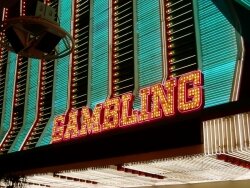You betcha: Is gambling our real national sport?
Most of us celebrate on July 4, but American institutions like the NFL, the NBA, and the Los Angeles Dodgers face uncertain futures and had little reason to shoot off fireworks.
When America’s big three– football, basketball and baseball– fall victim to lockouts and bankruptcy, where can a sports fan turn to feel patriotic? Believe it or not, there's something more American than baseball or football, something that has been with us since 1607 and has never experienced a dip in popularity (at least in private).
Gambling.
Americans bet on anything and everything. According to InTrade.com, on Friday, July 1, we were betting Dominique Strauss-Kahn had a 7 percent chance of being found guilty of at least one charge (down 43.7 percent and $1.31 a share from June 30) and 1:5 odds that Steve Jobs will step down as Apple’s CEO by December 31.
According to People of Chance, gambling was rampant in Colonial America. Games of chances were so popular that English financiers suspected it was why the colonies couldn’t sustain themselves. Captain John Smith noticed a problem early, and in 1610 Virginia adopted laws to curtail gambling. But its popularity was too strong (the colony tried again in 1612 and 1619). Recent digs at Jamestown turned up 12 dice and remnants of a pegged gambling game.
Having had 21 years to learn from Virginia, the Massachusetts Bay Colony banned gambling immediately, outlawing cards and dice the first year of the colony’s existence. But even fiery Puritans fell victim to the siren song; after one year, the colony reneged and allowed recreational gambling, though it was still illegal to hustle.
Cards as we know them date from the 14th century, and dice have been around since time immemorial (a set excavated in Iran was at least 3,000 years old by the time Roman soldiers rolled dice for Jesus’ robe), so there is nothing particularly patriotic about whist or backgammon (though rook, poker, and gin rummy are American inventions as is the Dead Man’s Hand).
It’s not the method that makes gambling the great American pastime; it’s the rabid desire.
Back in 1628, New Englanders were lashed (with a whip!) if they were caught with cards or dice, but what the Puritans failed to recognize is that one doesn’t need cards or dice to gamble. Bones, sticks, matches, pretzels, two horses (heck, one horse), a gust of wind and a crumb-toting insect. All one needs to gamble is the desire. And that’s something Americans have always had in spades (no pun intended).
The only thing Americans love more than watching (and arguing about) sports is betting on sports. Nevada alone clears more than $20 billion a year in sports gambling, and lockouts and bankruptcies provide new opportunities to indulge.
How long will the lockouts last? Who will fold first? Will Bud Selig take over the Dodgers, or will Frank McCourt find a way to hang on? (Current odds are 3:1 that Mark Cuban will buy the team.) The gambling possibilities are endless, and if history serves, Americans will take advantage of every one.
And why not? America itself was a gamble, a political and philosophical roll of the dice funded with lottery money from all 13 colonies. Ben Franklin did it, George Washington did it; even Thomas Jefferson noted his gambling wins and losses in his account books (he never could beat James Madison at horseshoes).
Undoubtedly, the NFL and the NBA will play again, and someone will rescue the storied Dodgers from the chopping block. But until those days come, Americans will continue do what we have always done best: bet on it.
~
Juanita lives on a farm in Charlotte County with her husband, son, and many dogs.
